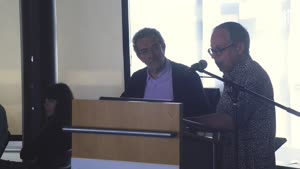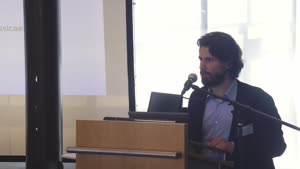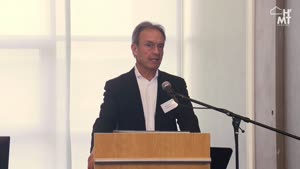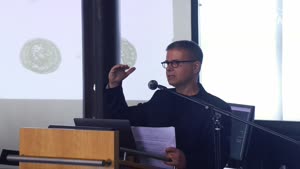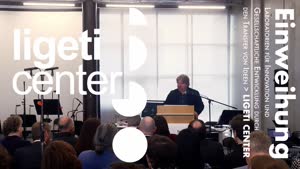MULTIVERSE SYMPHONY – Komposition für Ensemble und Quantencomputer (Eduardo Miranda) - HfMT Videoteam - HfMT
- MEDIATHEK
- Alle Videos
- HfMT
- HfMT
- Ligeti Zentrum - Einweihung
Alle Videos
1679 Aufrufe
03.05.2023
MULTIVERSE SYMPHONY – Komposition für Ensemble und Quantencomputer (Eduardo Miranda)
MULTIVERSE SYMPHONY – Komposition für Ensemble und Quantencomputer von Eduardo Miranda (University of Plymouth)
Flute, clarinet, bassoon, horn, violin, cello, contrabass, and live electronics
by Eduardo Reck Miranda, 2023
Yalda Zamani (conductor)
opus glitch_
A Performance-Research Experimental Lab from Contemporary Chamber Orchestra Elbe
Rafal Zalech, Violin
Katrin Szamatulski, Flute
Samuel Stoll, Horn
Jonathan Heilbron, Double Bass
Ronan Whittern, Bassoon
Jakob Nierenz, Cello
Nora-Louise Müller, Clarinet
Multiverse Symphony was composed with quantum computers. And its performance involves live interaction with quantum hardware via the Internet and features Q1Synth, a novel quantum computer musical instrument.
In the 20th century, pioneering composers changed the face of music through electronic technologies, and experiments with chance and determinism.
For example, as early as the 1930s, Edgar Varèse varied the speed of turntables to produce distortions and collages. But it was not until the 1950s that significant new kinds of music began to emerge. In 1951, John Cage used an Oriental oracle to create Music of Changes for piano: he consulted the I Ching to make compositional decisions. And around the same time, Pierre Boulez composed Structures for two pianos. Every aspect of this piece was decided by pre-determined rules, which Boulez followed strictly. György Ligeti’s Artikulation, which is entirely electroacoustic, is another notable piece of this era. Ligeti synthesized sounds electronically. Then, he cut the recording tape into pieces and devised a method to compose with them, which is partly aleatoric and partly rule-based.
With the advent of digital computers, composing like Varèse, Cage, Boulez, and Ligeti became mainstream. Nowadays, most composers are versed in programming computers to manipulate recordings and simulate rules and randomness. But computing technology is ever-evolving. And so is music.
The music of the 21st century is changing through Artificial Intelligence and novel types of computers. Most notably, quantum computers.
As quantum computing technology looms on the horizon, Miranda teamed up with Moth (a quantum technology and arts company) and the Contemporary Chamber Orchestra Elbe to create Multiverse Symphony.
A quantum computer deals with information encoded as quantum bits, or qubits. The qubit is to a quantum computer what a bit is to a digital one: it is a basic unit of information. In hardware, qubits live in the subatomic world. They are subject to the laws of quantum mechanics.
Miranda programmed quantum computers to generate musical materials with which he composed Multiverse Symphony. He leveraged quantum mechanical phenomena – such as superposition, entanglement, and interference – to create music in ways that would be unfeasible using a standard digital computer.
Acknowledgement: Part of Multiverse Symphony was composed during a research residency in the Center for Quantum Technologies and Applications (CQTA) at DESY (Deutsches Elektronen-Synchrotron), Zeuthen, Germany, in 2022. The composer thanks CQTA for providing access to quantum computers to realise this piece.
Eduardo Reck Miranda is a composer working at the crossroads of music, science, and new technologies. His background as an Artificial Intelligence (AI) scientist and a classically trained composer with early involvement in avant-garde pop informs his distinctive music. He has composed for BBC Radio 3, BBC Concert Orchestra, BBC Singers, and Scottish Chamber Orchestra. Currently, he is a professor in computer music at the University of Plymouth and an associate researcher at Quantinuum, where he is pioneering new approaches to musical composition with quantum computers. His latest books, Handbook of Artificial intelligence for Music and Quantum Computer Music, are published by Springer Nature.

